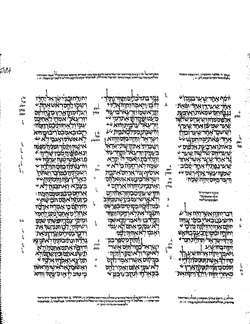Zephaniah 3
| Zephaniah 3 | |
|---|---|
|
Haggai 1 → | |
|
| |
| Book | Book of Zephaniah |
| Bible part | Old Testament |
| Order in the Bible part | 36 |
| Category | Nevi'im |
Zephaniah 3 is the third (and last) chapter of the Book of Zephaniah in the Hebrew Bible or the Old Testament of the Christian Bible.[1][2] This book contains the prophecies spoken by the prophet Zephaniah, and is a part of the Book of the Twelve Minor Prophets.[3][4]
Text
- The original text is written in Hebrew language.
- This chapter is divided into 20 verses.
Textual versions
Some most ancient manuscripts containing this chapter in Hebrew language:
- Masoretic Text (10th century)
- Dead Sea Scrolls: (2nd century BC)[5]
- 4Q77 (4QXIIb): extant: verses 19‑20[5]
- 4Q78 (4QXIIc): extant: verses 2[5]
- 4Q82 (4QXIIg): extant: verses 3‑5[5]
- Wadi Murabba'at Minor Prophets (MurXII): extant: verses 1‑6, 8‑20[5]
Ancient translations in Koine Greek:
- Septuagint (3rd century BC)
- Dead Sea Scrolls: (2nd century BC)[5]
- Naḥal Ḥever (8ḤevXIIgr): extant: verses 6-7[5]
- Theodotion version (~AD 180)
Structure
NKJV groups this chapter (with cross references to other parts of the Bible):
- Zephaniah 3:1-7 = The Wickedness of Jerusalem
- Zephaniah 3:8-13 = A Faithful Remnant
- Zephaniah 3:14-20 = Joy in God’s Faithfulness
Verse 16
- In that day it shall be said to Jerusalem:
- “Do not fear;
- Zion, let not your hands be weak.[6]
- "Let not your hands be weak" - "Let not thine hands be slack" (KJV) — cited (paraphrased) in Hebrews 12:12).
Verse 17
- The Lord your God in your midst,
- The Mighty One, will save;
- He will rejoice over you with gladness,
- He will quiet you with His love,
- He will rejoice over you with singing.”[7]
- "The Mighty One, will save" is translated from Hebrew: גבור יושיע gib-bōr yō-shî-a‘. The word "gibbor" (= "mighty"), here as an attribute of God, is used in Isaiah 9:6 as one of the attributes of Messiah, who "has all power in heaven and earth"; whereas the word "yoshia" has the same root verb "yasha" (="to save") as "Jesus" (="he saves" or "savior"), for Jesus Christ, who will be in the midst of His people, and at the head of them, will save them from the enemies (evil ones); to which salvation this passage has chiefly a respect.[8]
See also
- Ethiopia
- Jerusalem
- Judah
- Zion
- Related Bible parts: Deuteronomy 32, Jeremiah 29, Hebrews 12
References
- ↑ Collins 2014.
- ↑ Hayes 2015.
- ↑ Metzger, Bruce M., et al. The Oxford Companion to the Bible. New York: Oxford University Press, 1993.
- ↑ Keck, Leander E. 1996. The New Interpreter's Bible: Volume: VII. Nashville: Abingdon.
- 1 2 3 4 5 6 7 Dead sea scrolls - Zephaniah
- ↑ Zephaniah 3:16
- ↑ Zephaniah 3:17
- ↑ Gill's Exposition of the Entire Bible
External links
| Wikisource has original text related to this article: |
| Look up Zephaniah in Wiktionary, the free dictionary. |
- Jewish translations:
- Zephaniah (Judaica Press) translation with Rashi's commentary at Chabad.org
- Christian translations:
- Online Bible at GospelHall.org (ESV, KJV, Darby, American Standard Version, Bible in Basic English)
-
 Zephaniah public domain audiobook at LibriVox Various versions
Zephaniah public domain audiobook at LibriVox Various versions
This article is issued from
Wikipedia.
The text is licensed under Creative Commons - Attribution - Sharealike.
Additional terms may apply for the media files.
